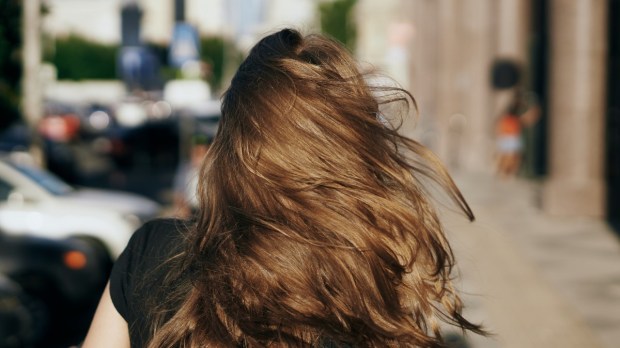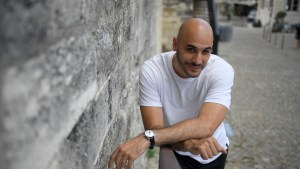At the chaplaincy of a large Parisian university, Inès, who is 20 years old, shares her testimony with a smile on her lips, contagious joy, and a touch of humor. Today, the young woman is a catechumen and is on her way to baptism. Inès seems radiant and fulfilled in her new life as a Catholic, certain that she has chosen the right path. “Discussions with me after five minutes return to questions of faith … in a way that’s quite inexplicable!” she exclaims.
Last summer she discovered street evangelism. “It’s about going to meet someone as Christ would.” Opposing the rhetoric of self-indulgence leading to happiness, the young girl is convinced that what really makes people happy is Christ. She’s also very involved in her school’s chaplaincy program. For Inès, faith is a precious gift that she wants to share, and she incarnates this grace on a daily basis through the joy she transmits.
But Inès hasn’t always been Catholic. Raised in Islam since her birth, the young woman had no doubt that the Muslim faith was the right one until 2021. She believed that “if you had to believe in God, it was through Islam, and nowhere else,” she recalls. The faith of this brilliant philosophy student was mainly intellectual.
Looking back on her life, she now realizes that the experiences of faith she had as a child were a sign that God had long been preparing her for conversion. She remembers being in a car with her uncle at age 7 when she was suddenly “struck completely as if by lightning.” She felt “caught up in the power of God.” These moments occurred several times during her adolescence, a period marked by doubts.
“In my previous life, I had moments of real spiritual aridity. I went off in all sorts of directions thinking I was looking for myself, without seeing that there was another problem upstream,” she explains. “I needed to know who God was for me, the role he played in my life, and who I was in relation to him, a question to which Islam does not give an answer.”
Finding answers in Catholicism
Today, everything is clearer for Inès, who has found invaluable resources in Catholicism. While she had “a bit of an intellectual faith” before, Inès’ conversion was primarily spiritual. She realizes that “her way of living her own interior life is not at all the same” since she became a Christian. Her faith is much more incarnate, and her relationship with God has also changed a lot. Particularly sensitive to the mystery of the cross, she feels perpetually accompanied by God, especially in suffering. Called and touched by Christ, she explains, “Jesus is the person of the Trinity who reconciled me with God.”
During her first year of studies in literature, she went through a particularly difficult ordeal and her life took a considerable turn. At that moment the young woman rejected God, considering him responsible for her suffering.
“If Jesus hadn’t come to save me, I think I would’ve lost my faith,” she says today. One day when she was in deep despair she walked into a church. Staring at a cross, she didn’t “see” anything, but she heard a message. As surely as if someone were speaking to her, she felt Jesus invite her to lay everything down on him: “You don’t have to carry this.” The moment she left the church, Inès knew that “something had changed very suddenly.”
Some time after her first conversion, Inès was once again faced with trials and uncertainty. Once again, Christ came to her “in a way that was a little different from the first time, which was very beautiful and very free.” It was then that she said to herself: “too bad for my parents,” knowing they would not find it easy to accept her conversion. She came across the words, “He who puts his hand to the plow and looks back is not fit for the kingdom of God,” which solved everything for her. “We haven’t cut ties, but it’s not easy.”
Her relationship with her family is complicated, as they are still practicing Muslims. Inès prays every day for their conversion, as well as that of all Muslims. She experiences the sense of community that is characteristic of Christianity with her friends and her chaplaincy. “This joy of sharing the faith with your brothers and sisters, with the Body of Christ, the communion of saints that creates this bond,” is something she did not have in Islam, which she describes as “a rather individualistic religion.”
Reading the lives of saints
Today, Inès regularly reads the lives and writings of saints. She says that she finds “an inestimable richness” in the writings of St. Alphonsus de Liguori. “I think he touched me because of my relationship with trials, which is always very complicated.” This saint helped her to accept that “we do not choose our own crosses,” and that “it’s through the most painful crosses that we are most sanctified.” Inès admits, “It’s very difficult to say with perfect unity of heart, ‘Lord, thank you for this suffering, because it brings me closer to you if I make good use of it.’”
Her favorite Gospel? The Gospel of St. John, which has “a beauty that I find extraordinarily disturbing; the more I read it, the less I feel I understand.”
Inès feels that she has been accompanied for a long time by St. Thérèse of the Child Jesus. Inès learned a great lesson about holiness from her life. “St. Thérèse is so perfect! What spiritual difficulty could she possibly have in her life?” Behind the “somewhat smooth” outward appearance is actually an interior life of immense magnitude, “simply more hidden because it is much more hidden in the mystery of God,” she says.
On a daily basis, Inès notices a multitude of “small and extremely striking signs,” but also certain texts in the daily readings that are “extraordinarily well adapted” to her life today.



